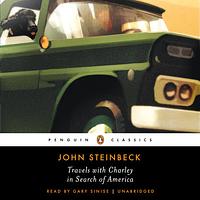Take a photo of a barcode or cover
This is my favorite Steinbeck book. I haven't read it in years, and really enjoyed this audiobook. Still as good as I remembered.
I disliked how rich and pampered Steinbeck seemed. I liked when he went south and talked about racial tensions. That last conversation in the south with the black student made me tear up, it was good.
I dislike how the story isn't real. How much was fabricated? I disliked the part where he wanted to kick Charley after listening to a preacher deliver a fiery sermon. I disliked the part where he almost shot two coyotes. Maybe these are changes that have come with time. Who knows. My main takeaway was, this guy got soft in his old age.
Most of the book I liked, these were the parts I did not like.
I dislike how the story isn't real. How much was fabricated? I disliked the part where he wanted to kick Charley after listening to a preacher deliver a fiery sermon. I disliked the part where he almost shot two coyotes. Maybe these are changes that have come with time. Who knows. My main takeaway was, this guy got soft in his old age.
Most of the book I liked, these were the parts I did not like.
Some of Steinbeck's insights still ring true today. Glad I read this book club pick, even if it took me WAY too long. (Finished several months after we discussed it -- but I did get partway through before the meeting.)
adventurous
emotional
reflective
slow-paced
adventurous
hopeful
inspiring
lighthearted
fast-paced
I’m a sucker for Steinbeck, but how could you not be? The way he gets at people (the heart of people) and places (and the heart of places) is truly transformative. Hit the nail on the hammer.
The main character in this book--John Steinbeck--is a successful author in his late 50s. He has a lot of disposable income, a family (and a dog, the titular poodle) he loves and no real reason to drive around the country in a camper other than to get back in touch with "America." These facts do not a sense of urgency make, but I appreciated his lack of pretension. Although he is adamant that his travel notes do not add up to an assessment of America, he does make prophetic observations about the information age, American mobility and the fallout of a culture of waste. I also liked his musings on everything from redwoods to racism and his dignified adoration of Charley.
"I was born lost and take no pleasure in being found."
Sooooooo I am shocked that I picked this up of my own free will. And I liked it. Haha!
I mean, I'd only ever read one book by Steinbeck before--"Of Mice and Men"--and it was for school (enough said). So *why* would I pick this up? Well, it's a travel memoir. And frankly, after a year plus of pandemic life, I needed to read about travel and how life was BC (Before Covid). Nothing ventured, nothing gained, right? I'd either like it or not.
Wow. I really liked it. So much so, I'd actually voluntarily (so far, lol) pick up another Steinbeck book. He writes thoughtfully, engagingly, poetically. I laughed out loud a few times, even!
The read was just what I needed right now.
Content note: Some language. One scene likely about a dalliance that I'm too naïve to actually recognize for what it is. Part of a chapter set in New Orleans at the beginning of desegregation; Steinbeck recalls watching Ruby Bridges attend NoLa's William Frantz Elementary School and the surrounding reactions.
I mean, I'd only ever read one book by Steinbeck before--"Of Mice and Men"--and it was for school (enough said). So *why* would I pick this up? Well, it's a travel memoir. And frankly, after a year plus of pandemic life, I needed to read about travel and how life was BC (Before Covid). Nothing ventured, nothing gained, right? I'd either like it or not.
Wow. I really liked it. So much so, I'd actually voluntarily (so far, lol) pick up another Steinbeck book. He writes thoughtfully, engagingly, poetically. I laughed out loud a few times, even!
The read was just what I needed right now.
Content note: Some language. One scene likely about a dalliance that I'm too naïve to actually recognize for what it is. Part of a chapter set in New Orleans at the beginning of desegregation; Steinbeck recalls watching Ruby Bridges attend NoLa's William Frantz Elementary School and the surrounding reactions.
A beautifully written recollection of Steinbeck's travels around the US in his truck 'Rocinante' and his "dog", Charley. I say "dog" because I'm surprised a man like Steinbeck would have a pet as ridiculous and effeminate as a poodle, but maybe it was his wife's choice, who knows. But nearly every sentence in this short travelogue reads beautifully and in parts profoundly, interspersed with amusing moments - such as when he makes a birthday cake for Charley or when he starts yapping at a bear - to some darker sides of people, notably near the end when he picks up a hitchhiker in the Deep South who goes on a racist tirade which is really hard and unpleasant to read. But if Steinbeck's aim was to try learn more of what it means to be American, and the identity of the country and the people, so is exploring all its facets important. Whether it be a line of prose or just an observation on what he's feeling/seeing, there's something of value on nearly every page.




